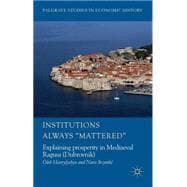Drawing on a vast amount of secondary literature, the authors use data to support their historical study of Ragusa. They provide a close analysis of its economic evolution, in particular looking at its policies and institutions. The authors, using the perspective of New Institutional Economics (NIE), test a number of hypotheses on the determinants of success. The authors argue that Ragusa exhibits the characteristics of an a 'Tiger' economy with growth-promoting institutions. Their findings reveal evidence which suggests that Ragusa had strong fundamentals with prudent finances, effective rule of law, good governance, social fairness, business-friendly institutions and trade openness.
This text offers a comprehensive historical case study of Ragusa's economy, making it essential reading for scholars and researchers of economic history and development theory.









